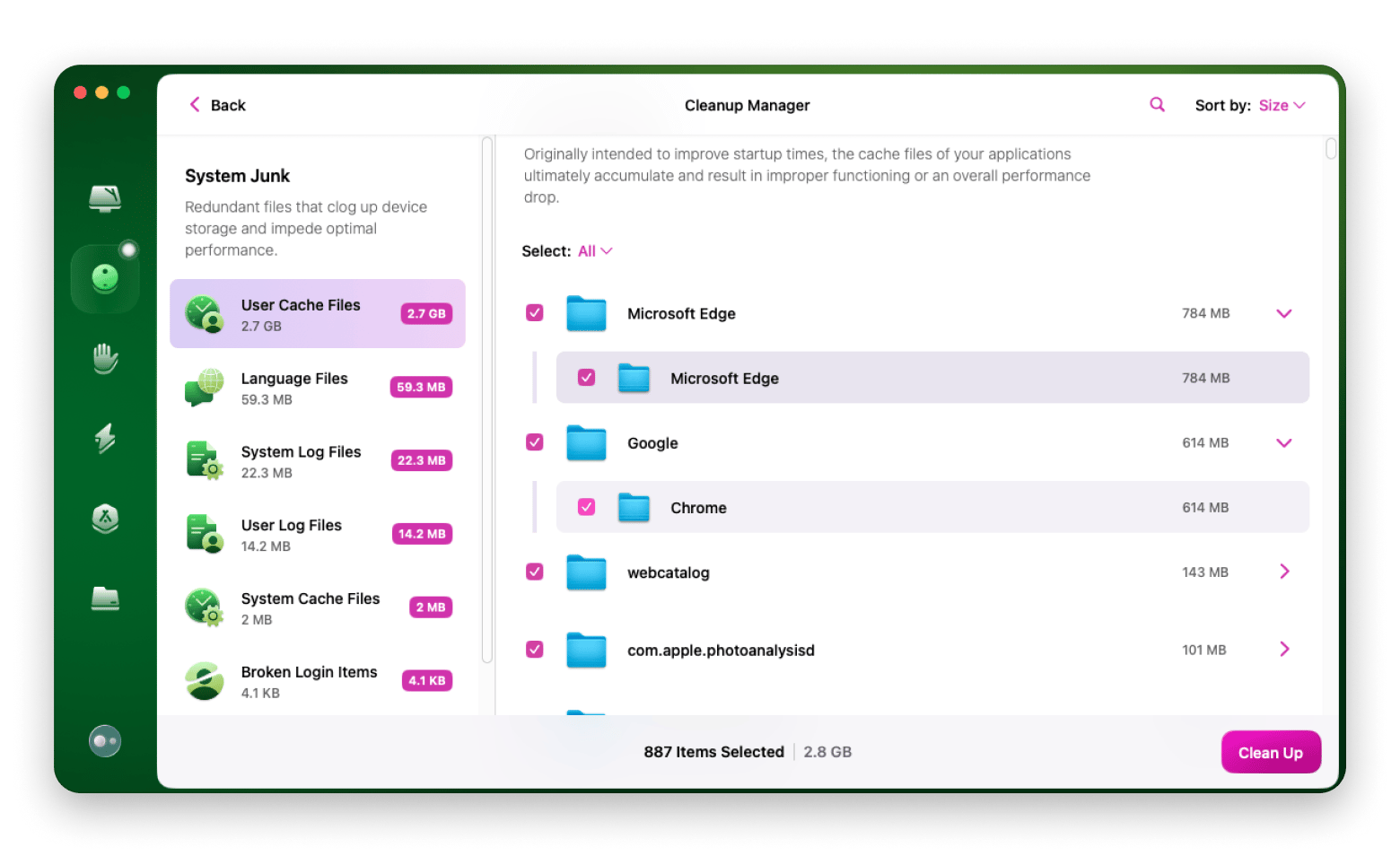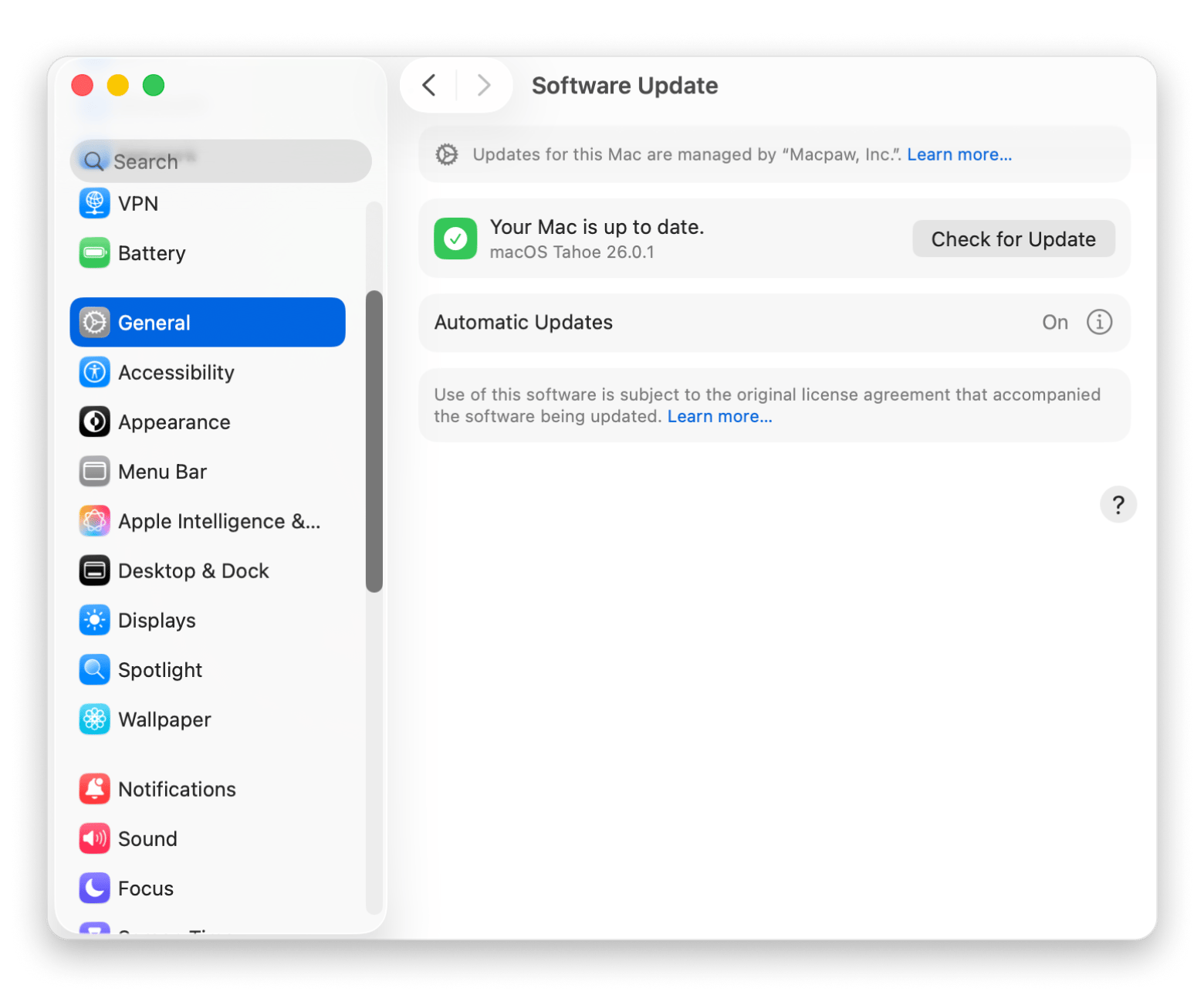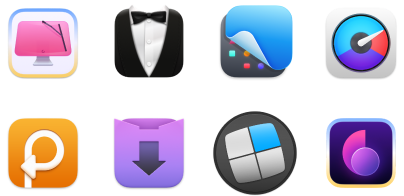How to fix macOS problems like a pro: A complete troubleshooting guide 2026
▼ Key takeaways:
- Start with basic troubleshooting: Most macOS issues are caused by simple things like too many apps running, outdated caches, or low storage. Begin by restarting your Mac, force-quitting unresponsive apps, and checking your available storage space.
- Keep macOS and apps updated: Many bugs and crashes happen due to outdated software. Go to System Settings > General > Software Update to install macOS updates, and make sure your apps (especially third-party ones) are also up to date.
- Use safe mode and new user accounts to isolate problems: Booting into safe mode helps determine if the issue is caused by third-party software. If your Mac runs smoothly there, uninstall recently added apps. Creating a new user account can also reveal if your old account data or preferences are the culprit.
- Fix deeper issues using recovery mode: If simple fixes fail, boot your Mac into Recovery Mode to run Disk Utility First Aid or Reinstall macOS without losing your files. Always back up your data with a tool like Get Backup Pro before reinstalling.
- Keep your Mac optimized with one tool: Use CleanMyMac from Setapp to remove junk files, clear caches, detect malware, and keep your system running fast and healthy. It’s an all-in-one solution to prevent and fix most macOS issues without needing professional repair. Try Get Backup Pro, CleanMyMac, and 250+ apps with a 7-day free trial.
Even on stable macOS versions, apps can still crash, performance can slow down, and you can get some random macOS issues that you can’t pinpoint the cause of.
The good thing is, most macOS problems are more annoying than they are serious. With the proper steps, you can fix them without losing your data or going to a repair shop.
In this guide, I’ll walk you through exactly that. We’ll start with the basics, as they can fix your issues quickly, and then progress to more advanced methods like using recovery mode and reinstalling macOS.
Basic troubleshooting for macOS problems
When your Mac starts freezing, being slow, or disconnecting Bluetooth, it’s easy to assume that something’s seriously wrong. But most macOS problems are caused by simple issues like cached files gone stale or too many apps competing for memory.
Before we look at advanced fixes, let’s start with the simple ones.
Restart your Mac
I can’t count the number of times a simple restart has saved me from a headache. When you restart your Mac, it clears temporary memory (RAM), stops hidden background processes, and resets your system resources. It’s basically a fresh start that doesn’t touch any of your files, so it can easily flash out macOS problems risk-free.
Force Quit unresponsive apps
When you find yourself with a spinning beach ball or an unresponsive system, a single app is responsible in most cases. Force-quit it to free up your resources and get back on track.
You can open the Force Quit Application window by pressing Command + Option + Escape.
Even better, you can use my favorite method – QuitAll. It’s a simple Setapp app that sits quietly on your menu bar and lets you stop any app on your system. It displays all active apps, and you can also view and quit background processes without needing complicated processes or commands.

Check out more tips on how to force quit on a Mac.
Check storage space
When your drive is nearly full, Mac slows down background tasks, interrupts updates, and causes random apps to crash as it needs breathing room to manage temporary files.
If these are the issues you are facing, check storage on Mac by going to Apple menu > System Settings > General > Storage.
If you’d like a quicker way to clear out your system without deleting crucial files, you can fire up CleanMyMac. It scans the entire drive and identifies all your system junk, large files, and duplicates. You can also use the app to remove malware and uninstall apps you no longer need. It’s available on Setapp.

Isolate and resolve software issues
In most cases, your hardware is innocent. When apps or the operating system start acting up, it’s often a conflict of background processes or macOS compatibility issues. But since you can’t always tell which one, the best approach is to try to isolate the issue.
Update macOS and applications
Different macOS versions usually have their issues, but Apple often releases updates to fix security issues and any bugs that may be in the operating system.
Always ensure you install the latest update by going to System Settings > General > Software Update.

You should also update all your apps to fix any bugs or compatibility issues. There are different ways to update macOS apps, but it essentially depends on the way you installed the app. If you’ve installed Setapp apps, you don’t have to worry about updates as Setapp handles them automatically in the background.
Boot in safe mode
Safe mode is a sure way of knowing whether it’s macOS itself or an app you’ve installed that’s causing the issues. The mode turns off third-party apps and login items, system extensions, and general processes that macOS doesn’t need.
So, if your Mac runs in safe mode without any issues, the problem is with some installed software. Start by uninstalling the most recent ones.
Here’s how to boot into safe mode on Apple silicon Macs:
- Shut down your Mac (Apple menu > Shutdown)
- Press and hold the power button until you see the startup options screen.
- Choose your startup disk
- Press and hold the Shift key, then click Continue in Safe Mode.
- Log in.
If you are on an Intel-based Mac:
- Shut down your Mac (Apple menu > Shutdown).
- Press the power button and immediately press and hold the Shift key.
- Log in.
Confirm that safe mode is indicated in the top-right corner of the screen.
If your Mac can’t boot at all or if safe mode fails, you can instead boot your Mac in verbose mode by holding Command + V during startup. It will give you a live log of everything happening during the boot process, which can help identify any system errors preventing the operating system from starting.
Test in a new user account
Maybe you have corrupted login items, caches, or preferences after using the Mac for a long time. A quick way to know this is to create a new account. Everything will be fresh, with no stored files.
To do this:
- Go to System Settings > Users & Groups to add a new user.
- Then try to see if everything works fine. If it does, the issue is your user data.
- Try to rebuild preferences, reset login items, and clean up unnecessary app data and cache with CleanMyMac.
Scan for malware
Even though Macs are a bit more secure than other operating systems, malware and adware can always sneak in. These can cause a wide variety of macOS problems, including apps crashing and inconsistent performance due to unexpected CPU spikes.
To know if this is the cause of your issues, check for malware on your Mac using a trusted scanner. If you already have CleanMyMac, you don’t need a separate tool, as it has a reliable malware scanner.

Using recovery mode for deeper macOS issues
When you can’t really pinpoint the cause of your macOS problems, it may be time to step into macOS recovery mode. This is like Mac’s emergency room, where you can do some quick first aid and reinstall macOS if need be.
You can also use this functionality to restore your system to its last working point if you’ve been using Time Machine or Get Backup Pro.
Here’s how to use Time Machine to restore data.
Access recovery mode
Entering macOS recovery mode depends on your Mac’s chip:
- Intel-based Macs: Press the power button, then hold Command + R until the Apple logo or a spinning globe appears.
- Apple silicon Macs: Press and hold the power button until the “Loading startup options” page comes up. Click Options > Continue to open recovery mode.
To learn more, check out our guide on how to use recovery mode on Mac.
Run Disk Utility First Aid
When your disk is failing, running First Aid can help get everything back on track as it checks for corrupted files, directory errors, and logical damage, then repairs them.
You can access from recovery mode by opening Disk Utility and selecting your main volume (usually Macintosh HD).
Reinstall macOS without deleting files
If disk repair wasn’t enough, you can refresh macOS to fix the performance and solve a variety of macOS issues. The Reinstall macOS option is available in Recovery Mode, so you only need to click it and follow the prompts. You don’t have to worry about data loss as this method can reinstall macOS without deleting files. You can think of it as giving your house a fresh coat of paint without a makeover.
Perform a clean install
If nothing else seems to be working, you can erase everything on your startup disk for a fresh start. With this method, you can be sure to fix all software-related issues on your Mac.
However, remember that it will clear out all your data, so back up every file you need. Ensure that you also confirm the correct drive and the macOS version you are installing. It will take more time than the others, but your Mac will feel brand new again.
Address hardware-related problems
Sometimes the problem isn’t with your software but your hardware. Maybe you have a bad memory module, the fan isn’t working well, or there’s a faulty cable.
In such cases, even reinstalling macOS won’t help much. Identifying these problems early can save you from many unnecessary processes.
Run Apple Diagnostics
A good start is to let macOS diagnose the hardware, if it can. You can use Apple Diagnostics for this. It will run a complete scan of your key components, including memory, storage, logic board, and power systems.
Here’s how to access Apple Diagnostics:
- Apple silicon Macs: Shut down your Mac, then press and hold the power button until “Loading startup options” appears. Press Command + D to start Apple Diagnostics.
- Intel-based Macs: Restart your Mac and immediately hold the D key until a progress bar appears.
The test runs automatically on most macOS versions, but you’ll need to select the specific test in macOS Tahoe. Apple Diagnostics will then report any issues it detects, along with reference codes.
Reset NVRAM/PRAM (Intel Macs only)
Intel Macs have a small section of memory that stores system settings, and a malfunctioning one can cause macOS Bluetooth problems, sound issues, and Wi-Fi issues. Resetting it can resolve these issues by reinitializing the module.
Here’s how to rest NVRAM/PRAM:
- Shut down your Mac (Apple menu > Shut down)
- Press the power button and immediately hold Option + Command + P + R.
- Release the keys after 20 seconds.
Your Mac will now restart with hardware defaults.
Reset the SMC
If the issue seems to be related to power, say overheating or charging issues, you can reset the System Management Controller (SMC) on Intel-based Macs.
- Shut down your Mac.
- Press and hold Shift + Control + Option.
- Press the power button for 10 seconds.
- Release all keys and turn your Mac back on.
You can readjust any settings you need to.
Seeking professional help
If the above have not worked for you, it may be time to seek professional help. You can contact Apple Support or visit an Apple Authorized Service Provider to ensure that you get a proper diagnosis and repair.
How to fix macOS problems: Solved
While macOS problems can be caused by a wide variety of issues, you can always narrow down the cause by trying simple fixes and advancing to more complex ones. This will help isolate the issue and make it easy to fix with the steps outlined in the guide.
If the issue is caused by a single app or minimal system resources, you can use QuitAll to close running apps and background processes. You can also fire up CleanMyMac to remove old cache files and system junk, as these can corrupt your system. If the issue is more complicated and needs macOS reinstallation, ensure you back up your data with a tool like Get Backup Pro.
All these apps are available on Setapp, the best all-in-one platform for macOS, iOS, and web apps. You can take advantage of the platform’s 7-day free trial to try out any of its 250+ premium apps.
FAQ: How to fix macOS problems
What are the most common macOS problems?
The most common macOS problems are:
- Slow performance
- Unresponsive apps that can bring out the beach ball
- macOS Bluetooth problems
- Wi-Fi issues
- Startup errors
- Random freezes or crashes.
These are caused by a wide range of issues, but you can troubleshoot them by narrowing down using built-in macOS tools and third-party tools likeCleanMyMac.
How do I fix macOS Bluetooth problems?
You can fix macOS Bluetooth problems by trying different fixes, such as:
- Turning Bluetooth on and off
- Removing and reinserting the device
- Resetting your Bluetooth module ( Shift + Option > Bluetooth icon > Reset the Bluetooth module).
If it’s a persistent issue, delete the Bluetooth .plist file for macOS to create a fresh one.
How can I safely reinstall macOS?
You can safely reinstall macOS by using recovery mode on your Mac. However, you should still ensure you back up your data with Get Backup Pro, as processes can always divert from the original plan.
What should I do if my Mac keeps freezing or apps crash?
Frequent freezes and app crashes are often caused by software conflicts or insufficient system resources like RAM and processing power. Start by force-quitting unresponsive apps using (Command + Option + Escape) or the QuitAll app from Setapp. You can also restart your Mac, use Disk Utility to check for drive errors, and boot into safe mode to isolate the issue.
When should I contact Apple Support?
You should contact Apple Support when your Mac refuses to start, keeps shutting down unexpectedly, or shows any other signs of hardware errors. You can also run Apple Diagnostics to know if there’s a hardware issue, then contact Apple Support or an Apple Authorized Service Provider.
How do I check for hardware issues on my Mac?
You can check for hardware issues on a Mac by running Apple Diagnostics. It’s built into every Mac and can help pinpoint a malfunctioning component.
Here’s how to run Apple Diagnostics:
- Apple silicon Macs: Shut down your Mac, then press and hold the power button until “Loading startup options” appears. Press Command + D to start Apple Diagnostics.
- Intel-based Macs: Restart your Mac and immediately hold the D key until a progress bar appears.
In macOS Tahoe, you’ll need to specify the test you want to run, but it’s automatic in all other macOS versions.
How do I resolve Wi-Fi connectivity issues on macOS?
You can resolve Wi-Fi connectivity issues on macOS by running Wireless Diagnostics. To do this:
- Hold the Option key and click the Wi-Fi icon
- Choose Open Wireless Diagnostics. It will analyze common issues like interference and connection strength.
- Note that if you are using a VPN, Proxy, or Firewall, you should disable it temporarily, as it can block your internet connectivity depending on the settings.
What steps can I take if my Mac is running slowly?
In most cases, a Mac that’s running slowly simply needs a cleanup. You can use a tool like CleanMyMac to remove junk, check for malware, and uninstall unnecessary apps. Ensure you have at least 20GB of free storage, as macOS needs some breathing space.
How do I recover deleted files or lost data on macOS?
You can recover deleted files and lost data on macOS using iBoysoft Data Recovery. It’s an easy-to-use tool that performs deep scans and helps recover data from formatted disks, unreadable drives, and even Macs that won’t boot.
Can older macOS versions cause compatibility issues with apps?
Yes, older macOS versions can cause compatibility issues with apps that are developed for newer operating systems. These apps may have updates meant for newer frameworks that will fail if the OS doesn’t support them. If you are running an older macOS version, ensure that you are running the supported versions of those apps.





